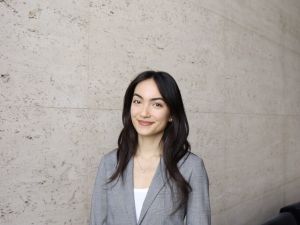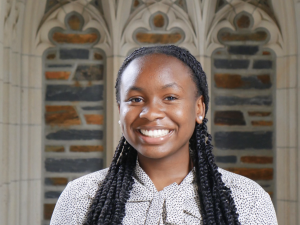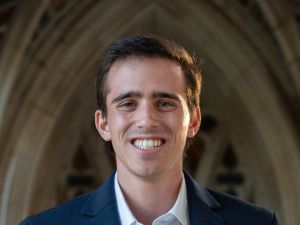Student Spotlight: Mary Kate Merenich

This month’s Student Spotlight features Mary Kate Merenich from Linwood, New Jersey. Merenich is a senior majoring in Neuroscience with a minor in Psychology. Her journey toward pursuing a Neuroscience major began long before she stepped onto Duke’s campus. Merenich’s story is a powerful example of how illness can alter the course of one’s life—but doesn’t have to define it. Her experiences serve as an inspiring reminder of how personal challenges can ignite curiosity and a drive to explore unanswered medical questions.
At just two years old, Merenich suffered a sudden bilateral attack on her optic nerves, leaving her temporarily blind. A pathologist explained that her condition was the result of an opportunistic virus of unknown origin, which triggered an underlying autoimmune response. She spent the next decade undergoing tests for a multitude of autoimmune diseases, but her doctors were never able to uncover the original cause of her blindness. Fortunately, Merenich regained vision in her right eye shortly after the complete loss, allowing her to live a relatively normal life. To this day, there is still no treatment available to regenerate the diminished myelin sheath surrounding her optic nerves. This experience sparked a lifelong curiosity about the brain—especially the white matter damage that had altered her vision. "Having been subjected to my doctors’ differential diagnoses, I wanted to join the inquiry into the most pressing unknown of my life," she reflected.
When Merenich arrived at Duke, neuroscience felt like a natural fit. Studying Neuroscience, gave Merenich a complete view of the human experience not just through a broad perspective of sociocultural influences, psychology, or history but also through scientific, hands – on – methods. The research methods and technologies that neuroscience provides like brain imaging, electrophysiology etc. allow us to test hypotheses about the brain and behavior and see real-time changes in the brain is fascinating. But being a Neuroscience major is more than just learning to measure and analyze the human experience in a concrete, scientific way. It’s also about connecting and being part of a larger community and giving back and that’s what she found at NeuroCare.
NeuroCare is an organization that seeks to educate members of the Duke and Durham community about neuroscience, psychology, and mental health topics. Merenich’s job within Neurocare’s Community Outreach was to help formulate lessons and activities catered to local elementary school students about the brain and behavior. "NeuroCare taught me how much fun it is to discuss the brain with other people and further cemented my love for neuroscience.", she reflected. From cerebellum games to Halloween-themed amygdala lessons, completed with “candy neurons”, Merenich brought brain science to life for the next generation.
NeuroCare also helps Merenich discover that she enjoys working with kids. This led her to apply to be a research assistant at the Bergerson Lab at the end of her freshman year. The Bergelson lab specialized in defining milestones in infant language acquisition. Here, Merenich helped run psychological experiments on language. She also transcribed recordings of infants and toddlers in their natural linguistic environments. When Dr. Elika Bergelson and her lab moved to Havard a year later, Merenich transitioned to an auditory neuroscience lab, the O-lab directed by Dr. Tobias Overath. Alongside graduate student Jiayue Liu, Merenich investigated "hidden" hearing loss and internal auditory noise using EEG.
After spending a semester abroad, experiencing other languages and drawing from the preliminary interest in language research from her time in the Bergelosn’s lab, Merenich decided to base her senior thesis on the intersection between language and neuroscience. After returning to Duke, she began a project focused on the phenomenon of language attrition, or the “unlearning” of a language with nonuse and the passage of time. Working alongside Even Hare, a graduate student, they studied phonological attrition—a degradation in one’s ability to use and recognize phonemes—in a foreign language (FL) context. The study aimed to address the behavioral, neural, and demographic factors that contribute to one’s experience of phonological attrition in their learned FL.
They focused on people who had learned Mandarin Chinese as a foreign language and had different levels of exposure to the language outside of class. The goal was to understand what factors—like behavior, brain activity, or personal background—might explain why some people lose this phonological ability more than others. Their research found that it wasn’t how long someone had been out of class that mattered most. Instead, there were links between how many total languages a person spoke and how well they did on tests related to hearing and recognizing Mandarin sounds. This connection showed up in both behavior (test performance) and brain data. Merenich was able to present their research findings at the Cognitive Neuroscience Society Conference in Boston as well as successfully defend her thesis, resulting in her graduating with distinction this May.
Graduation is often the time of reflection, and like any other major, there is often a challenge associated with STEM majors. Reflecting on the biggest challenge facing STEM students today, Merenich emphasizes the importance of being an effective science communicator: "What good is a project if you can’t explain its utility to your mom, your neighbor, your best friend, your congressman?" she encourages all STEM students to master the art of tailoring their message for any audience—to practice delivering their pitch in varying lengths of time, to keep their audience engaged, and to advocate for science whenever the opportunity presents itself.
Merenich credits her time at Duke for her becoming the most confident version of herself. From rigorous academic courses to ample research opportunities and diverse extracurricular activities and a community that supports and elevates and always aims to give back. She is proud to be a Blue Devil and is ready to take on new challenges and share the Duke’s value in other communities.
After graduation, Merenich will head to Washington, D.C. to begin a fellowship with the Medical Countermeasures Coalition (MC2). MC2, led by executive Taylor Sexton, combines expertise from academia, the biotech industry, and non-profit organizations to work with policymakers and government agencies on matters of biodefense and health security. She is excited to apply her experience to the public health and healthcare policy domain post-graduation.




